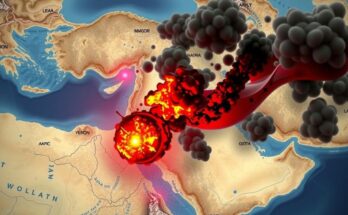The M23 rebel group’s activities in eastern DRC extend beyond seeking control over mining resources; they reflect a deeper strategy focused on local power struggles and governance. M23 aims to undermine Congolese authorities, control trade routes, and impose taxation to sustain its influence. Historical grievances related to land and authority, alongside the military involvement in governance, complicate the conflict’s resolution, necessitating thorough community engagement for peace.
The crisis in the eastern Democratic Republic of Congo (DRC), particularly regarding the Rwandan-backed M23 rebel group, has been simplistically interpreted primarily as a struggle for control over the region’s rich mining resources. While the M23 launched its recent offensive in 2021 and presently exerts control over significant territories within North Kivu province, the underlying motivations extend beyond mere resource acquisition. A deeper examination, informed by rigorous field research conducted in partnership with local experts, highlights that M23’s strategy is deeply entwined with historical battles over land, local governance, and authority rather than solely economic gain from mining operations. Our investigation encompassed interviews with a diverse array of stakeholders in North Kivu, collectively shedding light on the intricate dynamics at play. Significantly, M23 is engaged in a broader objective to establish local power by displacing Congolese authorities, disrupting traditional governance structures, and instituting its own taxation systems. This approach allows the rebel group, along with its Rwandan backing, to siphon economic support from local communities without necessarily taking direct control of mining operations. A critical aspect of this analysis involves recognizing the historical context that has shaped local land disputes, which can be traced back to key events since the country gained independence in 1960. The migration of Rwandan workers to the DRC during Belgian colonial rule significantly impacted local demographics and land ownership, setting the stage for later conflicts. As the struggle for land rights intensified, armed groups became an avenue through which communities sought redress, enduringly complicating the power relations among diverse ethnic groups. Of particular importance is the role of customary chiefs and local governance structures, which M23 has actively sought to undermine by replacing existing authorities with their own appointees. This strategy further fosters instability, as M23 not only imposes taxes but also seeks to control essential trade routes and eliminate records of customary claims to land, thus reinforcing its authority. Through its established taxation regime, M23 sustains its operations while entrenching its dominance over local populations, a process that has militarized local governance. Compounding this is the involvement of local armed groups that are largely unremunerated; they often resort to levying additional payments from civilians, exacerbating the financial burden on residents caught between conflicting armed factions. While access to minerals undeniably influences the conflict dynamics, our research illustrates that M23’s resurgence is rooted in historical grievances, authority struggles, and economic manipulation within local governance systems. The resolution of these entrenched conflicts will necessitate extensive dialogue and reconciliation efforts to restore customary authority and inter-community relations, a long-term commitment essential for attaining lasting peace in North Kivu.
The turmoil in eastern DRC, particularly around the M23 rebel group, is frequently presented as a straightforward struggle for mineral wealth. However, this perspective overlooks the intricate historical context and local dynamics that underpin the conflict. M23 emerged in a landscape shaped by historical migrations, colonial legacies, and deep-seated land disputes that extend back decades, complicating the narrative around resource control. The local socio-political fabric is heavily impacted by historical grievances, ethnic tensions, and the roles played by armed groups, making it imperative to consider these factors in any analysis of the situation.
In summary, the conflict involving the M23 rebel group in eastern DRC cannot simply be reduced to a contest for mining resources. Instead, it embodies a complex interplay of historical land disputes, authority struggles, and the local economy’s manipulation. Addressing these underlying issues through community dialogue and genuine conflict resolution strategies is critical to fostering long-term stability and peace in the region. The implications of this research call for a comprehensive approach to understanding and mitigating the multifaceted dynamics at play in North Kivu.
Original Source: www.defenceweb.co.za




